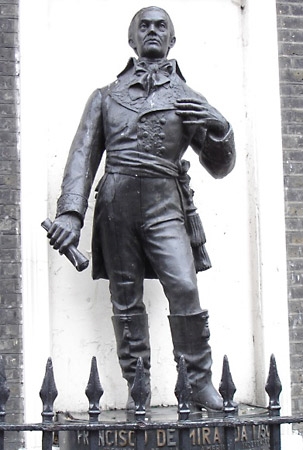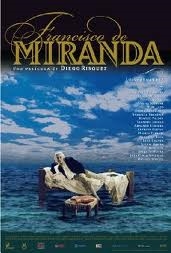 |
| http://www.britannica.com/EBchecked/media/119784/Francisco-de-Miranda-statue-in-London () |
Francisco de Miranda was an inspiring man because he accomplished so much in his life time. He started off by joining the military at a young age and ended a revolutionary hero. He did this through hard work and never giving up even when the odds were stacked against him. Leadership, perseverance, and always being strong are a couple of the morals he lived by.
Miranda was brave on and off the battle field always eager to serve his country more. He was brave because when it came to his country he would do anything to help it. "He had placed his arguments in a way that suggested his desire was only to serve his country and not that of any personal interest."(Samuel Grogan) Francisco de Miranda was a true patriot of his country, and he would do anything to be able to serve it. His motivation and desire for his country is what led him to become a great role player in the South American revolution. In 1772 Miranda joined the Spanish army and was commissioned as an officer.
 |
| (http://latinamericanhistory.about.com/od/latinamericaindependence/a/09fmiranda.htm ()) |
Miranda tried and tried again to serve his country, no matter what the circumstances where. He went through many obstacles but with his attitude he got through them never looking back.
"He served as a French Revolutionary general and was jailed for suspected treason and then acquitted. Returning once again to London, he became the leader of all the exiled plotters against Spain." (Francisco de Miranda) After he was imprisoned he had a lot of time to think of new ways to liberate South America. And he came back strong with more allies than he did before.
He wasn't a man someone could argue against and win; his attitude overcame anyone else's. "His rudeness and arrogance displeased many of his superiors and comrades, but he soon proved an able commander"(Francisco de Miranda). In many cases his "arrogance" is what led him to become the revolutionary patriot he died as. If he hadn't acted the way he did his efforts would have been pointless and he would have gotten little support. One would think that this attitude wouldn't get much support, but surprisingly many people looked at him as a great leader.
He was one of the first people in South America to begin the revolutionary efforts against Spain, making him one of the great leaders South America has had. "Here he met many of the leaders of the American Revolution and formed his plans for the liberation of South and Central America from Spanish domination. Hounded by Spanish agents, he fled to London, where he tried to enlist the aid of Prime Minister William Pitt in his plan of revolution."(Francisco de Miranda) He had many obstacles on his way to liberate South America from Spain but for him giving up was not an option. Because of the love and passion for his country, he was very successful and always got the job done. His bitter attitude got people's attention and made them stick with him. "Miranda found a great deal of verbal support for his ideas, but nothing in the way of tangible aid. He crossed to France, seeking to confer with the leaders of the French Revolution about spreading the revolution to Spain." (Francisco de Miranda) After time and time again of failed attempts to get the Venezuelan military to begin efforts to liberate South America, Miranda had to take things into his own hands. He set sailed to far away countries getting all the support he needed to begin the liberalization of South and Central America.
Miranda is one of the bravest and persistent leaders I have ever had the joy to study, when someone hears the name Francisco de Miranda most don't know the impact he made on all of their lives today. Unfortunately Miranda did not see the day of the South American liberation, but everyone in South America will be forever grateful for his contribution
Works Consulted
Francisco De Miranda, Precursor of Latin American Independence." About.com Latin
American History. New York Times Company. Web. 09 May 2012.
Francisco De Miranda (Venezuelan Revolutionary)." Encyclopedia Britannica Online. Encyclopedia Britannica. Web. 09 May 2012.
Grogan, Samuel. "Historical Text Archive: Electronic History Resources, Online since 1990."Historical Text Archive: Electronic History Resources, Online since 1990. 2012. Web. 03 May 2012
Page created on 5/19/2012 12:00:00 AM
Last edited 1/5/2017 11:48:47 PM
